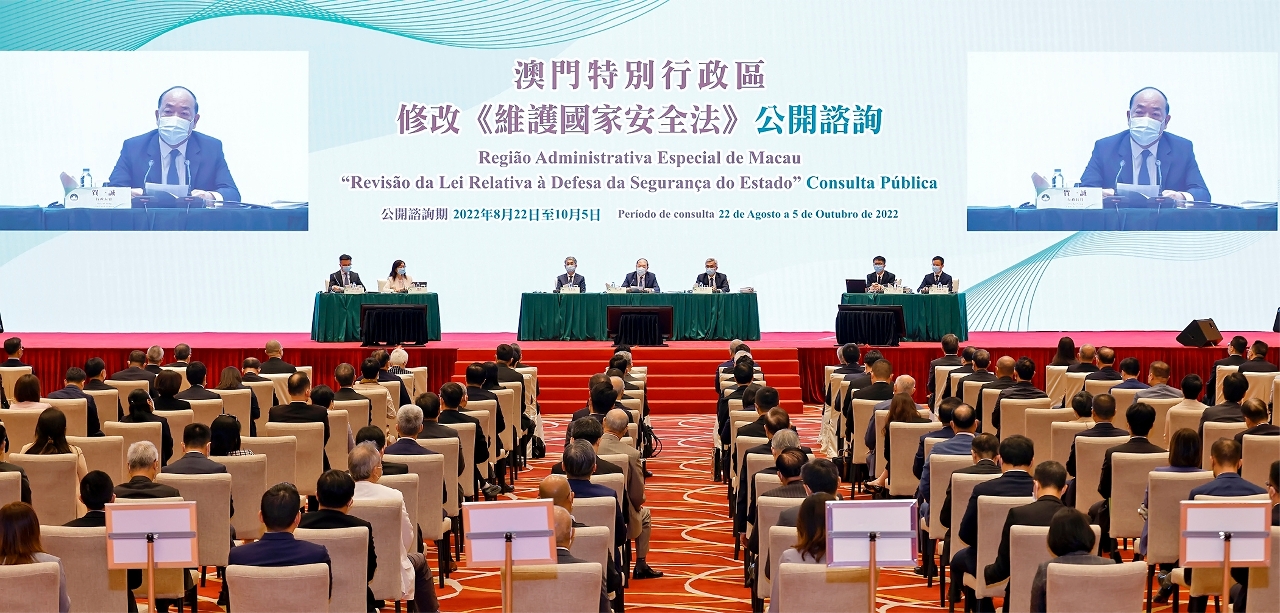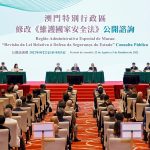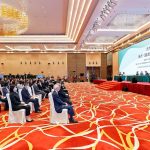 The Chief Executive, Mr Ho Iat Seng, attends the first public consultation session regarding amendment to the Law on Safeguarding National Security, to hear opinions from Macao delegates to the National People's Congress and to the Chinese People's Political Consultative Conference and representatives from the local political and legal sectors.
The Chief Executive, Mr Ho Iat Seng, attends the first public consultation session regarding amendment to the Law on Safeguarding National Security, to hear opinions from Macao delegates to the National People's Congress and to the Chinese People's Political Consultative Conference and representatives from the local political and legal sectors.
The Chief Executive, Mr Ho Iat Seng, said that the amendment to the law is a significant event this year regarding the Macao Special Administrative Region (MSAR) Government’s policy in terms of safeguarding national security. The matter was closely related to the long-term stability of the nation, and the sustainable prosperity and stability of Macao. The Chief Executive proposed four aspirations for all sectors regarding the amendment to the law.
The MSAR Government held the first public consultation session on the amendment to Law No. 2/2009 – “Law on Safeguarding National Security”, to listen to the opinions and suggestions from deputies of the MSAR to the National People's Congress, members of the National Committee of the Chinese People's Political Consultative Conference in Macao, and representatives of the political and legal sector.
A public consultation session co-chaired by the Chief Executive, Mr Ho Iat Seng; the Secretary for Administration and Justice, Mr Cheong Weng Chon; and the Secretary for Security, Mr Wong Sio Chak – was held on Friday (26 August) afternoon in the China–Portuguese-speaking Countries Commercial and Trade Service Platform Complex, in order to gather opinions and suggestions from the participants.
The Chief Executive said the Law on Safeguarding National Security that is currently in force embodies Macao’s constitutional responsibility to safeguard national security according to Article 23 of Basic Law of the MSAR, thus strongly facilitating national security and the long-term stability of Macao. However, due to pronounced changes in the internal and external security situation, and the severe security threats the country faces from different areas, the MSAR Government must make stronger preventive efforts to secure its governance.
Facing these national security risks, amending the Law on Safeguarding National Security would be the only way to safeguard national security, and actively and diligently fulfil an holistic approach to national security. The MSAR Government therefore decided to commence with this amendment to the law. During this 45-day public consultation period, the MSAR Government will listen to the opinions of all sectors and the public, in order to respond more effectively to the current overall security challenges. The Chief Executive urged all sectors of Macao to contribute ideas and suggestions on amending and perfecting the law.
While explaining the relevant policy, the Secretary for Security, Mr Wong Sio Chak, said the MSAR Government has promptly reviewed the existing Law on Safeguarding National Security, and implemented relevant preliminary work – including theoretical research, case analyses and comparative law studies – due to the concern of, and instructions from, the Central People’s Government.
Mr Wong hoped that this amendment to the Law on Safeguarding National Security could rectify the problems and inadequacies of the existing law, enabling the law to reach the same level as the laws safeguarding the relevant laws of the nation and the Hong Kong Special Administrative Region, so that the MSAR could implement the security law to national standards, upgrade Macao’s ability to coordinate and administer national security affairs, comprehensively prevent and penalise offences against national security, effectively prevent interference by external forces, safeguard national sovereignty, safety and development interests, and maintain prosperity and stability in Macao.
During the first public consultation session, 11 participants gave their views and suggestions. They all agreed with and supported the amendment to the law and said they believed that this is the right time to commence the work on amending the law. As the internal and external security situation and risks continued changing and increasing, amendment to the law was the way to help perfect the Law on Safeguarding National Security, which effectively enhances national security, maintains Macao’s public order, and facilitates Macao’s fulfilment of its constitutional responsibility.
While concluding the session, the Chief Executive urged the participants to convey the message about the law amendment to all members of the community, and raised four aspirations. They were the need to:
- Understand the significance of the amendment to the law. As national security and Macao’s safety are facing new challenges and changes, Macao must be proactive in tackling all kinds of risks. Macao must have a strong and more practical law on safeguarding national security, to support and coordinate safeguarding national security affairs according to the law, to prevent and suppress interference by external forces, and to safeguard more effectively national sovereignty, safety and development interests. The MSAR Government was now amending, in a timely manner, the Law on Safeguarding National Security, to ensure that its work on safeguarding national security can better fit with the new situation, and with the demands of the times.
- Be aware of the work challenges in relation to amending the law. The content of the amendment proposed by the MSAR Government is not only in response to the developing national security situation – but is also forward-looking, given development trends and the need to target actual national security issues. Therefore, Macao must uphold its bottom-line thinking and conduct comprehensive risk assessments and precise judgements regarding this amendment to the law.
- Build on the function of leadership: Safeguarding national security is not only the constitutional responsibility of the MSAR, but also the statutory liability of all people of China, including Macao people. Therefore, the MSAR Government will spare no effort in amending the Law on Safeguarding National Security. Macao also needs to harness concern, active participation, and facilitation from people in all sectors and all walks of life, in the hope that all participants can fully make use of their roles in society. This is in order that they can lead their institutions, social groups and organisations to take part in rational discussions – especially to explain matters correctly and to publicise relevant information in a way that is understandable and acceptable to the public. This in turn, is in order to facilitate critical deliberations, correct interpretations, and finally achieve social consensus.
- Fight against all disturbances and interferences. The amendment to the Law on Safeguarding National Security is a matter concerning the interests of the nation, the MSAR, and all Macao residents. It is an important protection for the public. During the public consultation period, people with ulterior motives would make a big fuss regarding the MSAR Government’s law amendment proposal, or even agitate people to impede or undermine progress with the law amendment through radical approaches. Facing the major issue of national security, we need the courage of Macao people to refute and clarify all hostile attacks and untrue information contrary to the amendment to the law, and have a clear-cut stance on guiding the process and eliminating all potential interference in the amendment to the law.
The Chief Executive also said that this amendment to the law was to ensure Macao’s work of safeguarding national security can better fit with the new situation, and the demands of the times. Macao must keep abreast of the times in order promptly to perfect the Law on Safeguarding National Security and fulfil an holistic approach to national security. This was in order more effectively to safeguard the sovereignty, safety, and development interests of the country, protect the safety and wellbeing of Macao people, and ensure a better future for the country and for Macao.
Some 200 participants attended Friday’s public consultation session, including: the Vice Chairman of the National Committee of the Chinese People's Political Consultative Conference, Mr Ho Hau Wah; the President of the Legislative Assembly, Mr Kou Hoi In; the President of the Court of Final Appeal, Mr Sam Hou Fai; the Secretary for Economy and Finance, Mr Lei Wai Nong; the Secretary for Social Affairs and Culture, Ms Ao Ieong U; the Secretary for Transport and Public Works, Mr Raimundo Arrais do Rosário; the Prosecutor General of the Public Prosecutions Office, Mr Ip Son Sang; the Commissioner Against Corruption, Mr Chan Tsz King; the Commissioner of Audit, Mr Ho Weng On; the Commissioner-General of the Unitary Police Service, Mr Leong Man Cheong; the Director-General of the Macao Customs, Mr Vong Man Chong; members of the Executive Council and the Legislative Assembly; Macao deputies to the National People's Congress; members of the National Committee of the Chinese People's Political Consultative Conference in Macao; leaders and representatives from various organisations, and associations from various sectors; the Judicial Council; the Prosecutors’ Committee; and officials from various bureaus of the MSAR Government.
The 45-day public consultation on the amendment to the Law on Safeguarding National Security began on 22 August and will end on 5 October. The consultation document on the amendment to the Law on Safeguarding National Security has been uploaded to the dedicated webpage:www.pj.gov.mo/RLDSE/zh/default.htmlfor public viewing and for downloading. Citizens may also collect the printed version of the consultation document on-the-spot during the public consultation sessions, or from, respectively, the Office of the Secretary for Security; the Judiciary Police Headquarters; the Public Administration Building; Integrated Government Services Centres; the Central District Public Services Centre; and the Islands District Public Services Centre.
The consultation period covers eight sessions. Of the seven still to be held, four will cover the economics and finance; social and cultural; transport and public works; and administration and judicial sectors. The other three sessions are open to all Macao citizens. To register to participate in the public consultation sessions, individuals can do so via the above-mentioned webpage, or telephone 8800 6323.
The MSAR Government also welcomes submissions of opinions and suggestions regarding the consultation, via either written correspondence (by post or by hand), or via telephone (8800 6321), fax (8800 6322), or email.





